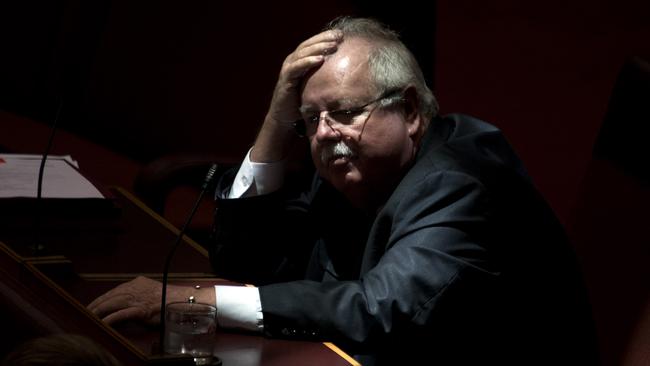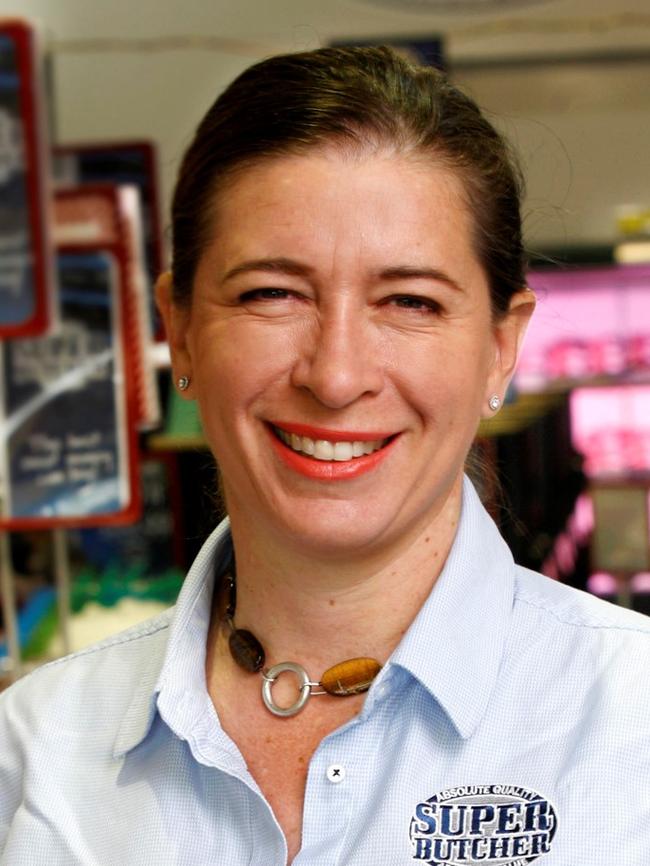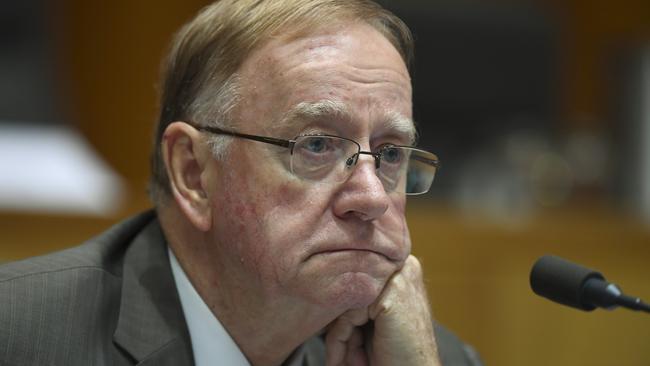Sitting members lose as change gusts through the LNP ranks
City folks are in the ascendancy among the ranks of Queensland LNP, much to the chagrin of many old-school Nationals.

After 28 years in federal parliament, you would hardly expect an old stager such as Ian Macdonald to go quietly when time was called on his career. Especially when it was his own party, not voters, wielding the knife.
But to those in the know in Queensland’s Liberal National Party, the relegation of the veteran senator from No 1 on the ticket to the virtually unwinnable fourth spot was no surprise. What caused the big stir at last weekend’s LNP state council meeting was that another senior senator, Barry O’Sullivan, also got the chop.
Unlike 72-year-old Macdonald, a former Howard government minister whose best years in politics are widely seen to be behind him, O’Sullivan is a mover and shaker in the LNP and the federal Coalition, a high-profile former party treasurer and gruff-spoken conservative who had the chutzpah to back a royal commission into the banks while Malcolm Turnbull was busily hosing down the idea. Aged 61, he has been in the Senate for only four years and seemed to have a lock on another six-year term.
Instead he lost preselection to businesswoman Susan McDonald, 48, the daughter of wealthy grazier and former Queensland and federal Nationals president Don McDonald. Predictably, the shake-up was trumpeted by party bosses as welcome generational change, not to mention a nod to the gender imbalance infusing the Coalition’s parliamentary ranks.
O’Sullivan’s supporters and allies saw it differently, and they are far from a disgruntled minority. To them, it was an affront to the party’s country and regional base, out of step with how old-school Nats conducted themselves. The phone lines have been burning up this week as shock at his dumping turned to anger. One prominent LNP identity, with deep ties to the Nationals grassroots, says the move against a sitting senator is unprecedented. Another complains: “I can understand that the party needed to move on a bloke like Macdonald. He had had his day. But Barry had runs on the board. He was effective. Why throw him under the bus?”

The ill-feeling continues to run high. Some of those sympathetic to O’Sullivan are pointing the finger at David Littleproud, the young gun Queensland MP who took over the agriculture portfolio when he was elevated to cabinet after Barnaby Joyce’s messy private life caught up with him. As reported in the news section of today’s paper, Littleproud has been accused of undermining O’Sullivan by canvassing for McDonald ahead of last Friday’s preselection, an explosive allegation emphatically rejected by the minister. “Minister Littleproud did not canvas for any candidate,” his spokesman said yesterday.
The recriminations have been envenomed by the tightness of the result: McDonald won by 121 votes to 120 for O’Sullivan at state council. The reaction in the room was one of stunned disbelief, with LNP president Gary Spence looking “aghast”, according to an onlooker. O’Sullivan still won’t talk in detail about what happened — except to say he will keep working until his term is up next June. Confidants say the former policeman is deeply disappointed but “philosophical” about being axed.
Most agree McDonald is an impressive candidate who will go places in Canberra. That’s not the issue. The simultaneous ousting of the two veterans has poured petrol on roiling tensions inside the LNP over that most elemental of paradoxes, its identity. Was it still a marriage between two equal partners, bringing city and country, Liberal and National, under a single umbrella? Or did the ordering of the party names reflect the true nature of the relationship: Liberal first, the Nationals a very distant second?
In a provocative statement on Monday, Macdonald alluded to the potential damage for the federal Coalition vote at this crucial juncture in the electoral cycle, with the “Super Saturday” by-elections barely a fortnight away, focused heavily on the tight contest in Longman, north of Brisbane, and the timing of the next general election in the mix. Other parties had “abandoned” north Queensland, said the man from Ayr, a sugar town south of Townsville. In case anyone missed the point, he added: “I feel bad to have let down my beloved north by leaving it without Senate representation for the first time in over 40 years.”
Macdonald also referenced the political “imperative” to give “decent, effective representation” to Herbert and Kennedy, the federal electorates that cover most of Townsville. Both are heartbreakers for the LNP. Kennedy has been held since 1993 by Bob Katter, who won it for the National Party before turning independent eight years later. His father, Bob Katter Sr, had grabbed the seat for the then Country Party way back in 1966. Having been pushed to preferences for the first time at the 2013 election, when he got the closest thing he has had to a fright, Katter romped home in the double-dissolution poll two years ago after the LNP lost its preferred candidate to illness.
Herbert went to Labor in 2016 in a lineball result, shifting it out of the Liberal-LNP column for the first time in a decade. When the Prime Minister gets around to firing the starter’s gun for the next election, which could be by winter’s end if Super Saturday goes his way, Herbert will be right up there on the Coalition’s must-win list. Labor leader Bill Shorten will be equally desperate to keep it. Kennedy also will be in play should the irascible Katter, now 73, not recontest.
Any whiff of internal discord in the LNP will be a worry for Turnbull, given how important Queensland is to his prospects. The Coalition holds 21 of the state’s 30 federal seats and has five Queensland senators, including O’Sullivan and Macdonald, whose longevity makes him father of the Senate. Turnbull wouldn’t be reassured by the LNP’s recent record: defeat at the hands of an unimpressive Labor outfit led by Annastacia Palaszczuk in last November’s state election has been chased by softening poll numbers for the federal Coalition in Queensland.
This week’s breakdown of Newspoll results for April-June show a recovery in the Coalition’s primary vote has stalled on 36 per cent, well below the 43.2 per cent it pulled in Queensland at the July 2, 2016, election, second only to Western Australia as Turnbull’s best state. If Longman is tight for Labor on a margin of 0.8 per cent, Capricornia in central Queensland and Forde south of Brisbane are danger-close for the LNP at 0.6 per cent.
Gladstone-based Flynn, outer-metropolitan Petrie and Peter Dutton’s seat of Dickson in suburban Brisbane would fall to Labor on swings of 2 per cent or less.
The groundbreaking merger between the Liberal and National parties to create the LNP a decade ago was a tailored response to the unique challenge confronting the conservative parties in Queensland, where the Nats had governed in their own right under Joh Bjelke-Petersen. The deal was designed to end confusion that Labor had exploited over who would call the shots in a state Coalition government — brutally underlined when then Queensland Liberal leader Bruce Flegg blew the 2006 election on day one. He got himself into a tangle over what would happen if his party won more seats than the Nationals, the senior Coalition partner.
The pay-off was Campbell Newman’s monster win at the 2012 state election under the LNP banner. But federally, the arrangements are less clear cut. While the operation of the Coalition parties is fully integrated in Queensland — the LNP raises funds and implements federal campaign strategies — federal MPs and senators sit in either the Liberal or National partyroom, each of which have their own rules and agendas. Traditionally, the Nats have operated as a tight-knit unit, outwardly more unified than their Liberal colleagues, deeply conservative on divisive policy issues such as climate change, a term that Joyce reportedly had vetoed during his time in charge.
That’s changed with the emergence of “new Nats” such as Littleproud, who openly acknowledges that climate change is a factor in the drought gripping much of the west of Queensland and NSW as well as northern Victoria. His push for a “forward-looking” strategy in agriculture to accommodate climate change has appalled hardliners in his party, who see it as a betrayal of the conservative base and values.
At the state level in Queensland, new LNP leader Deb Frecklington tried to hit the reset button on energy with a proposal to mandate investment in renewables by state government-owned corporations, a position she backflipped on yesterday after Turnbull appeared to contradict her during an appearance this week in Brisbane.
To old-time Nationals, the events at state council confirmed their worst fears about the LNP. “This has been coming for 10 years,” said one senior figure. “When the merger happened we had 7500 National Party members and 2500 Liberals … the party predominantly adopted the constitution of the old National Party and the culture.
“But that culture has started to shift, and what we saw Friday was the old guard that controlled the party lose control. They lost control of the floor of state council because most of the delegates there were from the southeast … it was a poke in the eye for the bush and north Queensland.”

Stung by the backlash, the LNP announced yesterday that McDonald would relocate from her home in leafy Clayfield in inner Brisbane to Townsville in the likely event she was elected from the No 2 spot on the Senate ticket. Spence, the party boss, told the Townsville Bulletin she would be a “fantastic representative for north Queensland”; she was well known there through her work as managing director of the Super Butcher group and director of industry group Beef Australia, and had grown up on a cattle property near Cloncurry.
Others point out that a range of factors were in play at state council — the equivalent of an ALP state conference — including its location in Brisbane. Sitting state and federal MPs, LNP state executive members, life members of the party, past presidents, representatives from the Young LNP and the LNP women’s division plus the chairs of various regional party committees are entitled to attend, but only 253 of the 340-odd eligible delegates registered, and evidently not all of those voted in the preselection ballot. Among the absentees was federal Nationals MP George Christensen who would have delivered the vote that could have pushed O’Sullivan over the line.
Unsurprisingly, there was a strong women’s vote for McDonald, especially after the federal Nationals’ chief parliamentary whip Michelle Landry, the MP for Capricornia, spoke at the convention lamenting the departure of frontbencher Jane Prentice, dumped from her Brisbane seat of Ryan in May. Brisbane city councillor Julian Simmonds, a former aide to Prentice, got the nod in another preselection boilover.
Landry says she told the conference: “I don’t believe as women we support each other enough and the only way to get more women into politics is for us to start voting for them.”
And, as one prominent Liberal pointed out, if it really was a case of the city-based vote swamping the old-guard Nats, then Scott Emerson, the inner Brisbane-based former LNP state treasury spokesman, who lost his state seat last November, should have reaped more than the 25 votes he received when he went for Macdonald’s top spot on the Senate ticket and lost to mining executive Paul Scarr.
“It’s not like the Libs are taking over the Nats because Susie McDonald got up and she’s National Party royalty,” one player said. “The tensions are being played up because of the personalities of the people involved: Ian, because he’s been there too long; Barry, because he’s a divisive figure.”



